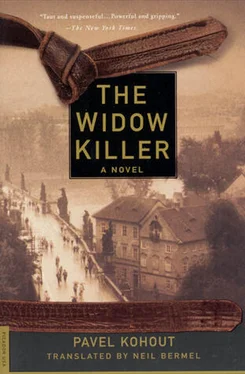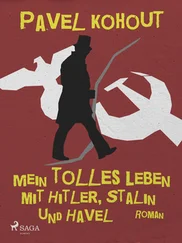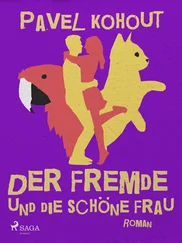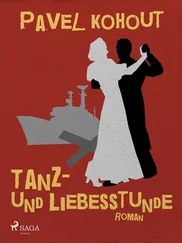As if reading his furtive thought, she continued.
“It was fate’s doing, not mine, that she died; her death isn’t on my conscience, nor should it be on yours. Good night.”
She suddenly rose and headed for the bathroom.
“I want to hold you,” he said.
“Not today. Your weakness is catching. I need your strength, so I’ll have to hold off. I’d rather go home, but he might be there, so let me stay, but pretend I’m not here.”
He bounced up so quickly that he was able to block her way.
“Grete! Everyone has the right to weak moments. And that’s what the other person is—”
“Don’t count on it,” she said brusquely. “I have to be strong when I’m alone. When we’re together, it’s your job. That’s why I love you.”
Get up, Jan!” Jitka said. “Enough sleep; time to go to work.” He could sense the touch of her face, which had moved next to his, but he did not want to open his eyes; those morning visits with her in the unknown reaches of sleep were now the most important moments of his life. He had no idea how he could have ever woken up alone and spent whole days without knowing they would fall asleep that night together. “Jan,” Jitka called again, “time to get up, beloved; today’s a big day for you!” He pretended he was sound asleep, so she would use her tender wiles, brushing lips against lips and blowing on his closed eyelids. Instead, she said despairingly, “Jan, enough already; go find that monster — he did kill me, you know!”
He blinked. On the night table was a daily calendar, frozen in time at February 14. The woman he had escorted home and stayed with ever since was dead, and he was hugging his mother’s old featherbed in his dormitory room near Number Four. He stood up, so as to be entirely awake before hopelessness hit, did a couple of stretches, and let the cold shower pound into him. By the time he had finished brewing his mother’s rose-hip tea, his defensive armor had closed around him again, impervious to thoughts of the body in the dark icebox.
He was in her service and had to fulfill the task she had set him; then he’d see what happened.
He got only Matlak and Jetel for his plan and was satisfied. He didn’t see Beran or even look for him. Most of his colleagues, who would normally have been around, were absent. Even a simpleton could tell that the brain stem of the Czech police was securing itself against the danger of another attack.
He realized that he had not seen a single German uniform on his way over. He had seen the film The Invisible Man several times before the war, and it always gave him goose bumps. The Germans, hidden behind the walls of former schools, universities, dormitories, and hotels now serving as barracks and offices, were suddenly more malevolent than they had been in full view. It reminded him of the stony plain above his village, where what appeared to be an innocent heap of brushwood would in the blink of an eye become a tangle of attacking vipers. Prague now seemed much the same way.
He therefore agreed at once when Buback offered to come along; the German could vouch for them in any confrontations with his countrymen.
The four of them formed a chain as each train arrived from Plze  , and questioned all the passengers. Most knew each other by sight from traveling to and from work. No one knew the man in the policemen’s photograph.
, and questioned all the passengers. Most knew each other by sight from traveling to and from work. No one knew the man in the policemen’s photograph.
Between trains Morava sat on a bench beneach the roof of the first platform and stared straight ahead. The others left him alone, and he tried to distract himself by fixing his thoughts on the insignificant. He calculated the length and height of the buildings opposite, counted the crossties in his vision, concentratedly followed the crooked flight path of one of the birds in a flock circling above the station.
At noon the others brought him bread with some kind of spread, in the evening a warm potato pancake; after the last train they took him off to sleep and brought him back before the first one the next morning. All of this he sensed as if in a dream, one he left only when another train arrived from Plze  . And no one, not one passenger, recognized that face.
. And no one, not one passenger, recognized that face.
“It’s the same people as yesterday,” Matlák said near evening.
Morava could see that himself. Rumors of the hunt for the widow killer had spread. When they saw the four men with photographs, the passengers would shake their heads or hands, and the men were stung by the first sharp retorts: Why were they still hanging around doing nothing? By now even that killer must know where they were. But Morava never raised an eyebrow or doubted his decision. The first thing Beran had taught him was patience.
That evening it paid off.
It was the novice Jetel who excitedly brought over an older man returning from his shift at the Beroun locomotive depot. Yes, he confirmed, he remembered the man well; on Sunday he had seen him waiting for the night tram with his coworker Karel Malina. He himself had waited behind a tree, because Malina was a well-known motor mouth. He’d been glad enough to be rid of him on the train; Malina had gone to look for matches and never came back. At the last moment, the railway worker had boarded the rear car of the tram and dozed all the way to the last stop. No, he didn’t know where Malina lived; surely the police could find out?
Malina’s other potential acquaintances had long since left the station. The only thing left to do today was follow up the lead. There were eleven Karel Malinas in Prague. When Morava began to plot a route for visiting them, Buback raised his first objection.
“It’s quite late and we could start a panic. They’ll think it’s the Gestapo.”
He stared in surprise at the German.
“Yes,” he said, “you’re right, thanks. Good night.”
In his room, it seemed he barely closed and opened his eyes only to find it was morning. He broke through the horrible moment of awakening when she died for him again, and set off on the trail of her murderer. As a good morning, Matlák and Jetel announced that only the German newspapers had published Rypl’s picture. The Czech papers had objected, saying that the Gestapo had used this method a few times already to try to catch Resistance workers; they could not risk taking the Germans’ bait in the eleventh hour.
As they left, Morava noticed a further gesture from Buback: he let the lanky Matlák have the front seat instead of himself, so he would not be cramped in the back of the car. Matlák took advantage of the language barrier to make a biting comment in Czech. “So they’ve finally decided they have enough ’living space’.”
At the depot they easily obtained Malina’s Prague address. Alarmingly, the repairman had not shown up for work yesterday or today, and had not notified them why. The personnel department clerk added that, sadly enough, this was a common occurrence these days; people find a thousand excuses, and this was probably just the beginning.
For Buback’s sake Morava conducted the conversation in German, and the clerk in his shirtsleeves suddenly wagged his finger at the liaison officer, like an old-fashioned teacher lecturing an unruly pupil.
“You promised Europe order, and you leave behind havoc and anarchy!”
Buback knew the four Czechs were waiting to see what he would say to this bold reproach.
He looked briefly from one face to the next, ending with the clerk’s.
“If an individual can apologize for a whole nation, then I hereby do so.”
No one said anything to that, and he was glad when Morava gave the order to leave. On the way back to the car he overheard another of Matlák’s sotto voce comments to Jetel.
Читать дальше

 , and questioned all the passengers. Most knew each other by sight from traveling to and from work. No one knew the man in the policemen’s photograph.
, and questioned all the passengers. Most knew each other by sight from traveling to and from work. No one knew the man in the policemen’s photograph.










